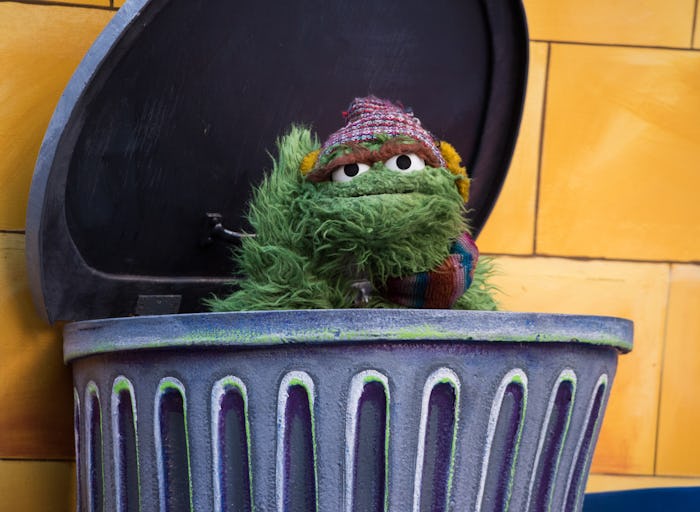Life

This Is Why Kids Really Need Oscar The Grouch In Their Lives
Like Oscar the Grouch, I don't always connect to people right away. I can be brisk, loud, and altogether too much. I spend a lot of energy trying to make myself less "me" and more palatable for everyday company, and I know I'm not alone. That's why Oscar the Grouch is important to kids: He's an example of why it's OK to feel like the grumpiest resident of the sunniest street around.
"I always thought that Oscar was an important character to have on Sesame Street because he's another embodiment of difference," Julie Dobrow Ph.D., Lecturer at the Eliot-Pearson Department of Child Study and Human Development at Tufts University in Massachusetts, tells Romper. It's Oscar's unique grumpiness that makes him not only essential to Sesame Street, but as a figure in our collective subconscious, she says. Like Big Bird's size, Grover's somewhat daunting excitement, autistic character Julia's behaviors, and even character Karli's struggle to cope with her mother's addiction, Oscar teaches children (and parents) the importance and value of inclusivity.
As Charlotte F. Cole and Lilith Dollard wrote in "Seeding Change: Using Children’s Media to Promote Social Inclusion the Sesame Street Way," Oscar the Grouch "was specifically designed to foster an appreciation of different perspectives, an important aspect of promoting social inclusion." For all of his rough attitude, and nontraditional living arrangements, he is not a hated character, nor is he a villain. Contrary to what popular culture would dictate, he is cherished and loved for his curmudgeonly attitude and ways, not in spite of them. Played for years by Carol Spinney (who recently passed away at the age of 85), Oscar is a character that is hard to love, but the many monsters and men of Sesame Street love him completely. They seek his counsel, his friendship, and in turn, Oscar (if begrudgingly at times) makes the effort to show up for his friends and family, even if it is hard for him to do so.
Dobrow says that "Oscar, and other grouches we come to meet, all live in what most people would think of as substandard housing — a trash can! — but he's never teased or belittled because of this." She goes to say that even when the "trash can gets reframed [during the] episodes when we go inside Oscar's world and find that it's much more complex," that this reframing "is an important lesson for kids about perspective taking." It is teaching children that what they first notice isn't the whole story of a person, and that even if we don't necessarily understand a person (or Muppet), there's value in getting to know them.
"Over the years there have been so many plotlines in which we've found out that underneath all that grouchiness is someone who, in his own idiosyncratic way, actually cares," she says.
For children, culturally specific social mores are all new, making them even more trying to navigate. We need Oscar because he is often children's first encounter with an unusually different personality, and instead of rejecting him, the characters on Sesame Street embrace him and accept him. "While other characters may disagree with Oscar’s likes and dislikes, they engage with him with a level of respect that models compassion and understanding of differences and conveys the message that people who are different can interact positively and can even be friends," noted Cole and Dollard. That ability to form respectful, positive friendships is often more than the rest of us manage to accomplish. I'm not saying that Oscar is advocating for people to get along all of the time, or even modeling how "we can all be friends." What he models is inclusion of people who are different, who are maybe just a little "much," a "little strange" to you or your children. We need Oscar because he teaches us to offer grace to those who present themselves in a way we don't understand.
I need Oscar because I need to remind myself that while I may be a lot, I am not unlovable or even unlikeable. I am merely different. I've spent a lifetime trying to reckon my personality with what is or is not normal, and it is exhausting. Kids like me need more Oscars. They need more examples of atypical personalities being cherished and loved because they are so few and far between. They need families and relationships that look different because these things are not societal monoliths. No one family looks like another, and some of them look nothing like what you'd expect.
And honestly, at some point in our lives, we are all Oscar. We are pushed to our limits with people and the world, and we just want to find a cozy place in comfortable surroundings and not be bothered. Oscar has been there for over fifty years, telling us that sometimes, that's OK.
Expert:
Julie Dobrow Ph.D., Lecturer at the Eliot-Pearson Department of Child Study and Human Development at Tufts University in Massachusetts
This article was originally published on